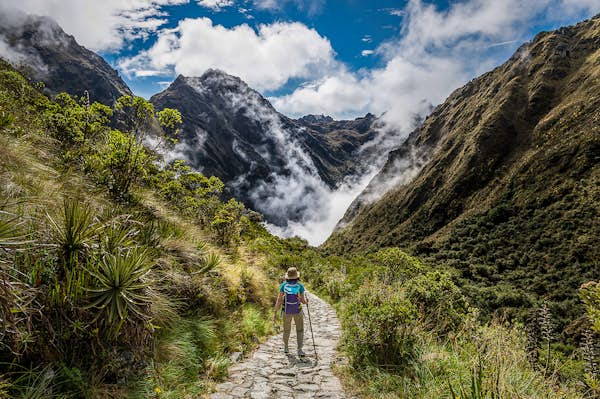It’s the most famous hike in South America – perhaps the world – and a must-do, life-changing experience. Hiking the Inca Trail through the Sacred Valley to Machu Picchu is both arduous and awe-inspiring. Four days of cold, pain and exhaustion dissipate as the mist lifts to reveal the emerald peaks and terraced ruins of the mystical ancient city.

Itching to go? Here are a few tips:
- The best months to visit are the dry months, which fall between May and September. The busy season really picks up during June to August, as summer vacation in the northern hemisphere kicks into gear and national holidays in Peru are observed. Take advantage of the low crowds during the shoulder months, such as mid to late April when Peru’s summer comes to an end. At this time of year the temperatures have not yet dropped to the frigid numbers experienced during winter and the rain has recently subdued, resulting in a lush scene of green that you’ll be able admire in the absence of rubbing elbows with hoards of other tour groups. While you won’t want to visit in the middle of the rainy season (trust us), October (and even the first weeks of November) is a safe bet for dry weather. Note that the Inca Trail is closed during the month of February.

- Make your Inca Trail reservations several months in advance – up to a year if you’re going during peak season. You can only visit with a licensed agency, and spots book up quickly.
- Choose your trekking agency carefully. Shop around and ask lots of questions: what you’ll have to carry, how many people to a tent, how many porters for the group, if there are arrangements for special diets. It’s worth paying more for a reputable agency that treats its porters well and respects the environment. We’ve recommended a few we like at the end of this article.
- No matter what time of year, the trail gets cold at night. Bring a warm sleeping bag and layer your clothes.
- Other must-brings: sturdy shoes, a flashlight (with fresh batteries), water-purification tablets, high-calorie snacks and a basic first-aid kit.
- Take a stash of small Peruvian currency for buying bottled water and snacks along the way, as well as for tipping the guide, cook and porters.
- Altitude sickness is serious and can ruin your trip. The biggest mistake you can make is to fly directly to Cuzco (3326m/10,910ft) and expect to hike the next day. Give yourself a few days to adjust to the altitude first.

- If you can’t get an Inca Trail reservation, don’t despair as Peru is full of excellent alternatives. Want Cuzco to be your starting base? The 4 to 5 day Salkantay Trek begins just a few hours outside of Cusco and ends in Aguas Calientes (where you can then access Machu Picchu), and is full of breathtaking natural views the entire way. No permits needed for the Lares Trek, a quickie 2 to 3 day hike in the Andes full of turquoise lakes and indigenous communities. Or maybe you’d like a change of scenery: Head to the Amazonas region in northern Peru to visit Kuélap, a massive stone wall fortress that sits at a higher altitude than Machu Picchu and is about 500 years its elder. An eight-hour bus ride north of capital city Lima is your ticket to Cordillera Huayhuash in Huaraz, a favorite of adventure junkies.

Make it happen
Ready to hit the road? We can recommend the high-quality Inca Trail Tour from G Adventures. It hits all the highlights, including Cusco, the Sacred Valley and Machu Picchu. On a green note, SA Expeditions and Enigma Peru are two companies offering personalized tours while holding true to company values of sustainability and conservation.
The Inca Trail is a hot topic on Lonely Planet’s Thorn Tree forum – so head there for other travelers’ advice on packing, on-the-ground tips and where to go after.
This article was originally published in May 2012 and refreshed by Agnes Rivera in August 2018.
